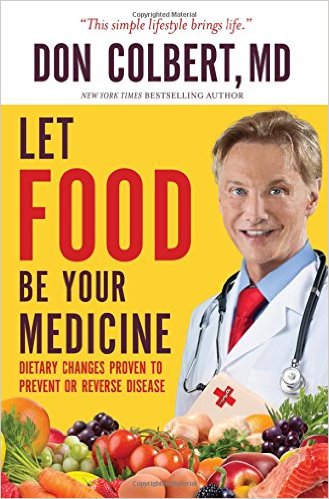
Physician-turned-journalist Don Colbert, MD offers intriguing and practical advice for optimum nutrition and wellness in Let Food Be Your Medicine: Dietary Changes Proven to Prevent and Reverse Disease. Early on, Colbert shares the deceptively simple insight that we catch colds but we develop chronic diseases like Type II Diabetes or Cardiovascular disease. That is not a coincidence, either. In Latin, “Dis” refers to being “apart”, disjointed, or having a negative or “reversing force.” Ease refers “freedom from pain” or being in a tranquil or peaceful state. In essence, disease signifies a breaking away from a peaceful or tranquil state. The process of developing and solidifying disease, however, is complex and involves lifestyle & environmental factors, as well as the interplay of all systems of mind, body, and spirit.
I tend to gobble up books about food, nutrition, and wellness and am naturally obsessed with how the gut or the “microbiome”, i.e. the ecosystem living in the core of your body, is more powerful and influential over our general health & well-being than we once imagined. A discussion about the microbiome is another conversation entirely and is far beyond my scope of knowledge; but Colbert does not overlook discussing current research about the delicate ecosystem living between our brain and bowel. How curious that we may even begin to view our food cravings as tiny demands from the bacteria in our guts who have lives of their own? In essence, we are feeding them. You better believe they don’t always have your best interests in mind, either. The little “voices in your head” (or, gut, in this case) take on a whole new meaning. Read this book to dig in a little deeper as to how and why our microbiome is so influential and critical to our overall health.
Colbert mixes testimonial with current medical evidence to present a compelling argument for being mindful and deliberative when it comes to what we put into our bodies. Learn about his struggle with autoimmune disorders and how his quest to heal himself resulted in weeding nightshade foods (peppers, eggplants, tomatoes) out of his diet. Not all food is equal in its ability to nourish, heal, or harm, either, as you may know. We often take for granted that we do not innately know what foods are harmful or helpful. Many of us grew up in homes in which our parent(s) worked and perhaps did not have the time to prepare and cook whole, nourishing meals all week long. In short, eating “healthy” is not common sense. Failure to meet your daily nutrient requirements or to altogether make harmful dietary choices is not therefore some testament to your lack of willpower. Quite simply, many of us have to learn how to make better food choices, and that starts with education. If you have any curiosity whatsoever in how you can better yourself simply by changing what you put into your body, read this book.
This book is not a fix-all for all that ails you, nor does it substitute for the relationship you have with your primary care physicians or doctors. Part of what is working about healthcare is that we acknowledge that wellness involves the alignment of mind, body, and spirit or the non-physical part of a human being. Grey’s Anatomy sums up the dilemma well in one episode in which Dr. Preston Burke, esteemed neurosurgeon, argues with Dr. Cristina Yang that nurturing a patient’s spiritual state is equally as important as the medical intervention being performed, for the reason that human beings are not merely physical bodies. The non-physical parts of us require care and respect, too. Though Colbert’s book does not discuss the role of spirituality in health in great depth, he no-doubt weaves his own faith into the book (but it is not oft-putting for non-Christians). I can most certainly recall a time in my lifespan of thirty-six years when the words “soul”, “spirituality” and “Ayurveda” would have never made an appearance in a discussion about disease, illness, or health & wellbeing. But today? We are becoming more interdisciplinary & holistic in how we not only view but “treat” illness — and how we care for whole human beings (not just symptoms).
If you are even the slightest bit curious about how food can harm or heal, read this book. If you would be amazed by the prospect of eating a diet that custom made to fight diabetes, Alzheimer’s, heart disease, cancer, auto-immune disorders — read this book. Believe it or not, one of the most powerful statements that Colbert makes in this book is this: cancer, depending upon the type and staging, can and very well does constitute a chronic disease that can actually be managed like other chronic diseases not unlike COPD, heart disease, and diabetes. I don’t know about you, but aside from a cure that’s the very best next thing! Bear in mind, Colbert is not claiming to have a cure for cancer; but he lays out, in one case, a diet plan that is tailored not only to the cancer patient but to the specific stage of cancer in order to increase the chances of putting the cancer into remission…and we can do this with vegetables, micronutrients, plants–with the plentitude of healing, delicious foods that are available to us should we be inclined.